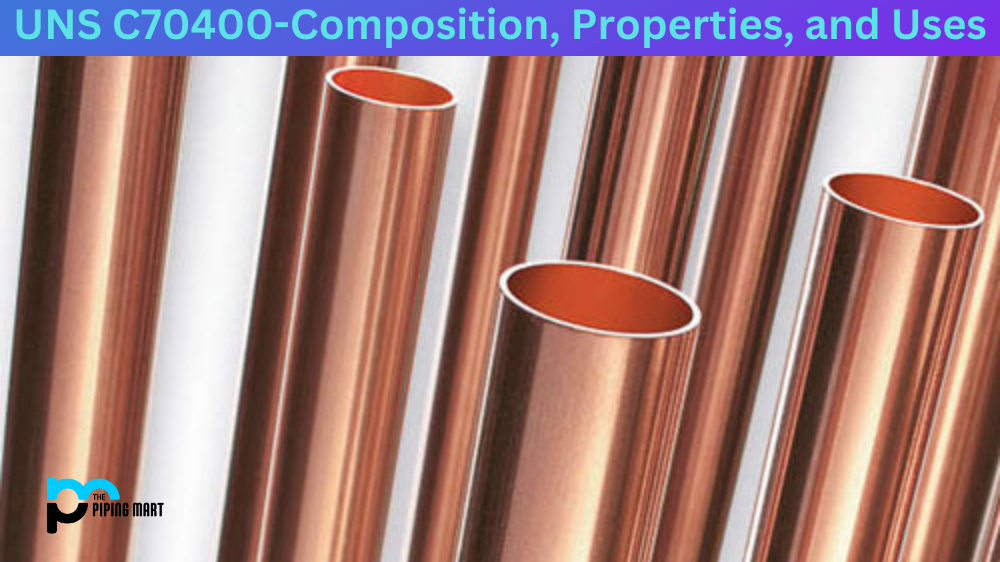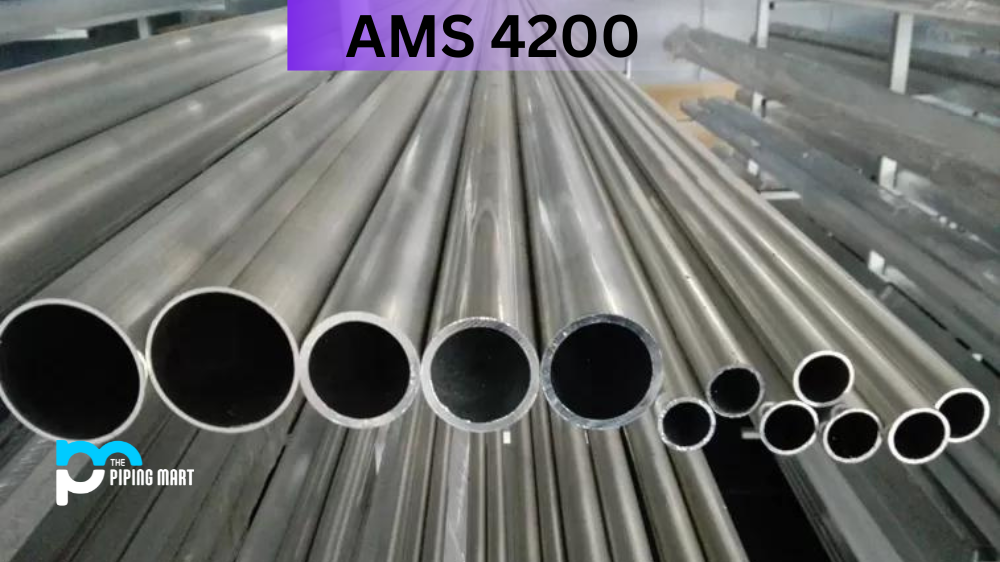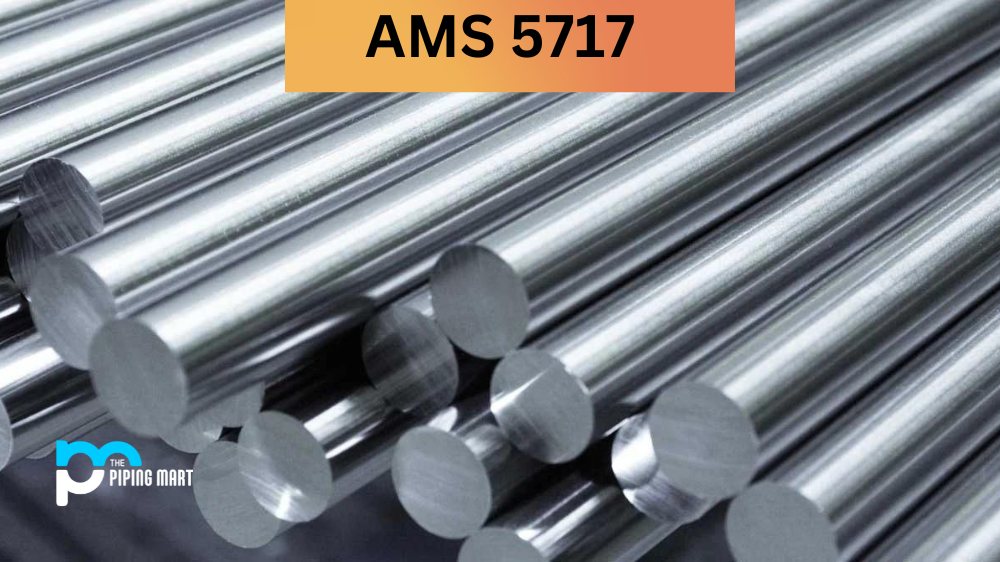UNS C70400 is a copper-nickel-silicon alloy widely used in various industries due to its excellent mechanical and physical properties. It is known for its high corrosion resistance, excellent machinability, and heat treatability. Also, it has good strength and wear resistance, making it an ideal material for applications that require durability and reliability. In this blog post, we will discuss the composition, properties, and uses of UNS C70400.
UNS C70400 Composition
C70400 is a copper-nickel-silicon alloy that contains about 1.1% nickel, 1.0% silicon, and 0.5% manganese. It also includes a small amount of iron, zinc, and copper, which imparts additional properties to the material. Combining these elements gives the alloy superior mechanical and physical properties.
| Element | Content (%) |
|---|---|
| Cu | 92.4 |
| Fe | 1.5 |
| Ni | 5.5 |
| Mn | 0.6 |
UNS C70400 Mechanical Properties
C70400 has excellent mechanical properties, such as high strength, good wear resistance, and fatigue strength. According to the ASTM B171 standard, the tensile strength of UNS C70400 is around 885 MPa, and the yield strength is about 415 MPa. Additionally, it has exceptional elongation and hardness, making it ideal for high-stress applications.
| Properties | Metric | Imperial |
|---|---|---|
| Tensile strength | 262-531 MPa | 38000-77000 psi |
| Yield strength (depending on temper) | 276-524 MPa | 40000-76000 psi |
| Elongation at break (in 50.8 mm) | 46% | 46% |
| Elastic modulus | 117 GPa | 17000 ksi |
| Poisson’s ratio | 0.34 | 0.34 |
| Machinability (UNS C36000 (free-cutting brass) = 100) | 20 | 20 |
| Shear modulus | 44.0 GPa | 6380 ksi |
UNS C70400 Physical Properties
C70400 has good thermal and electrical conductivity, a high melting point, and a low thermal expansion coefficient. The alloy has a density of around 8.74 g/cm³, with a specific heat capacity of 377 J/kg·K. Also, it has a thermal conductivity of 43 W/m·K and an electrical conductivity of 7.5 × 10⁷ S/m.
| Properties | Metric | Imperial |
|---|---|---|
| Density | 8.94 g/cm3 | 0.323 lb/in³ |
UNS C70400 Thermal Properties
| Properties | Metric | Imperial |
|---|---|---|
| Thermal expansion co-efficient (@20-300°C/68-572°F) | 17.5 µm/m°C | 9.72 µin/in°F |
| Thermal conductivity (@20°C/ 68°F ) | 64.0 W/mK | 444 BTU in/hr.ft².°F |
UNS C70400 Equivalents
- ASME SB111
- ASME SB359
- ASME SB395
- ASME SB466
- ASME SB543
- ASTM B111
- ASTM B359
- ASTM B395
- ASTM B466
- ASTM B543
UNS C70400 Uses
C70400 is widely used in marine, aerospace, and automotive industries, exhibiting excellent corrosion resistance to seawater and other harsh environments. It is also used in the chemical processing industry, exposed to acidic solutions. Additionally, it is suitable for high-pressure gas pipelines, heat exchangers, and electrical connectors.
UNS C70400 Corrosion Resistance
C70400 has excellent corrosion resistance in seawater, brackish water, and other harsh environments. Its high resistance to pitting, crevice, and stress corrosion makes it an ideal material for marine applications. It also exhibits good resistance to chloride-induced stress corrosion cracking and erosion corrosion.
UNS C70400 Heat treatment
C70400 can be heat-treated to enhance its mechanical properties, such as strength, ductility, and toughness. Annealing, solution annealing, and stress relieving are some of the heat treatment methods used to improve the properties of UNS C70400.
UNS C70400 Machining
C70400 has excellent machinability due to its low cutting forces, good chip formation, and low tool wear. It can be easily machined using standard processes such as drilling, turning, milling, and grinding.
UNS C70400 Welding
UNS C70400 can be readily welded using various welding techniques, such as gas tungsten arc welding, gas metal arc welding, and resistance welding. However, it is essential to use filler metals with similar composition and properties to the base metal to avoid cracking and deformation.
Conclusion
UNS C70400 is a copper-nickel-silicon alloy that has excellent mechanical and physical properties. Its high corrosion resistance, excellent machinability, and heat treatability make it an ideal material for various industrial applications. Its composition and properties enable it to perform well in harsh environments, making it a popular choice for the marine, aerospace, and automotive industries. Proper heat treatment, machining, and welding techniques can further enhance its properties, allowing it to suit various applications.

A passionate metal industry expert and blogger. With over 5 years of experience in the field, Palak brings a wealth of knowledge and insight to her writing. Whether discussing the latest trends in the metal industry or sharing tips, she is dedicated to helping others succeed in the metal industry.




